What Is PPC and How Does It Work?
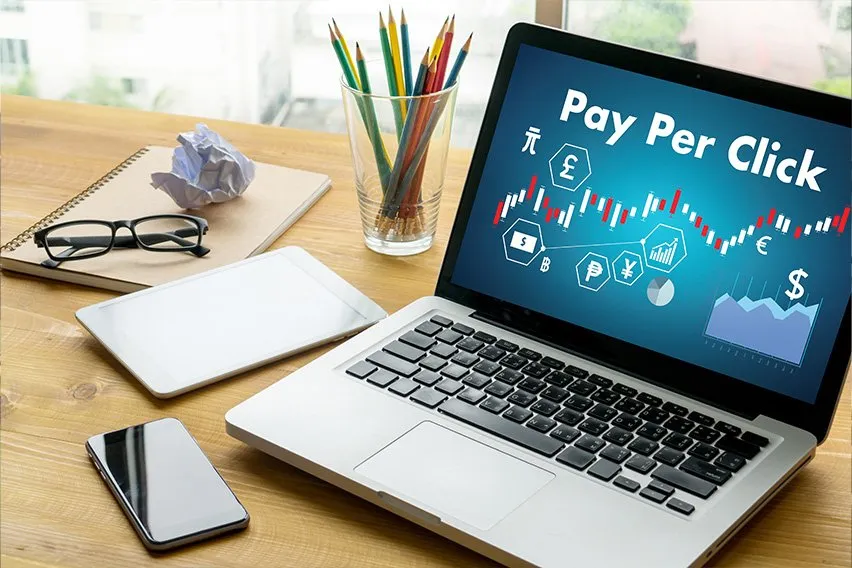
PPC or Pay-Per-Click advertising allows marketers to pay only when their ad is clicked by an online user. This online advertising model enables marketers to display ads in the sponsored results section of the search engine’s results page.
To appear when the right keywords and audience criteria are met, advertisers bid on the perceived value of a click. The ad is displayed in the sponsored links on the results page and a small fee is charged when the ad is clicked. Hence, the term Pay-Per-Click. The most popular PPC advertising programs are provided by Google, Bing, Facebook and Yahoo Search Marketing.
What this article covers:
What Is PPC?
PPC is a paid online advertising model in which advertisers pay a fee each time their ad is clicked. Marketers create ads and then bid on specific search phrases at the online auction. This allows them to display their ads on the search engine results page.
Every time an ad is clicked, sending the visitor to a landing page or the website, a small fee is charged. It is essentially a targeted form of buying website visits, that will hopefully end up in conversions, whether it’s a sign-up or a sale.
The different types of PPC ads include, search ads, local search ads, display ads and remarketing. These ads can show up on web pages, social media platforms, web pages and mobile apps. They usually look similar to the content around them. For example, the ads on social media channels such as Facebook and Twitter have the same format as organic posts but are marked with “Sponsored” or “Promoted”.

How Does It Work?
In Pay-Per-Click advertising, ads are subject to a bidding system known as the Ad Auction. It’s an automated process followed by major search engines to determine the validity and relevance of the ads that appear on their search engines results page
At the auction, advertisers bid on keywords that are relevant to their business. These are search terms they want to “trigger,” or display, their ads. For example, if your business sells camping, you will want to bid on the keyword, “best sleeping bags”.
Use keyword search tools to find relevant keywords with the right volume and the average cost per click.
Once you have the relevant keywords, create an ad and set it up in the search engine platform. Add the keywords that you want the ads to trigger for.
Set the bids for how high up in the ad section of the search results their ad will show. Apart from bid price, the advertising platform also looks at factors such as quality score and ad extensions to determine which ad is suited for the highest position. For example, the quality score sums up the quality of your ad based on ad relevance, landing page experience and click-through-rate.
When a user submits the search query, there’s a complex algorithmic calculation done by the search engine which is based on the Ad Auction. The results of these calculations determine the ads that are displayed, their order and by which advertiser.
Is SEM the Same as PPC?
Since the two SEM and PPC are both concerned with promotion via search engines, there’s a tendency to use them interchangeably. While PPC advertising tends to specifically relate to the type of adverts you see at the top of a search results page, SEM is a broader umbrella term covering many different types of promotion through search engines.
Search Engine Marketing (SEM) includes both paid and organic digital marketing strategies. The ultimate goal of search engine marketing is to increase the visibility of the business on major search engines. It includes search engine optimization (SEO) and pay-per-click advertising.
PPC, on the other hand, refers to paid online advertising where you don’t pay for displaying the ad on the search results page. Instead, you pay each time someone clicks on that ad to get to your website or landing page.
Why Should You Use Pay-Per-Click?
There are many compelling benefits of pay-per-click advertising:
- PPC is measurable and trackable. You can see how your campaigns are performing, including impressions, clicks, and conversions, the traffic you’re receiving and how the results correlate to your budget
- It provides a better understanding of the behavior and search patterns of the customers
- Unlike SEO, PPC allows you to quickly set up campaigns, create ads and find new customers and prospects
- You get budget flexibility. You can set up your ad budget and choose how much you want to spend. For example, if you see positive results, you can scale up quickly
- You get a wealth of targeting options, whether you want to target keywords through search ads or focus on a specific demographic on the display network
- Your ads work on all platforms, including mobile and desktop devices
What Is CPC?
CPC or cost per click is the actual price that you pay for each click in your pay-per-click advertising campaigns. The click refers to a visit or an interaction with the products and services of a business.
How Is CPC Determined?
The cost per click is determined by several factors, including your maximum bid, the ad rank of competitors and your Quality Score.
The formula to calculate CPC is:

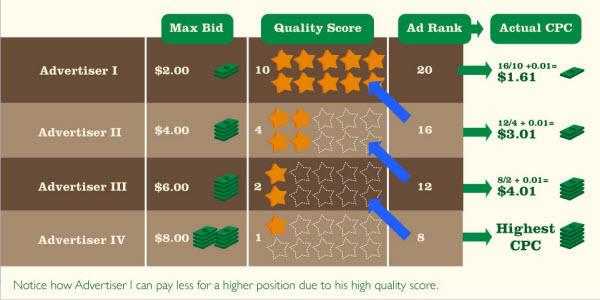
Source: https://www.wordstream.com/cost-per-click
The average CPC can vary based on your industry and the keywords that you’re bidding for.
Does Quality Score Affect CPC?
Quality score is the search engine’s rating of the quality and relevance of your keywords and PPC ads. It has a huge impact on the cost and effectiveness of the paid search campaigns as it’s used to calculate the cost per click.
The factors that affect your quality score include:
- Keyword relevance to the ad group
- Click-through-rate (CTR)
- Landing page relevance and quality
- Ad test quality and relevance
- Your account performance
A good quality score ensures higher ad rankings and lowers costs. To get a good quality score, you must research relevant keywords to add to your campaign, organize these keywords into effective ad groups, rewrite your ad text to include the keywords and optimize your landing page. To avoid wasting your money, optimize the campaigns by including negative keywords.
Why Is CPC Important?
The reason why CPC is important is that the price you set as your highest CPC is often the determining factor about the success of your pay per click campaign.
AdWords Optimization Basics
AdWords is a PPC network that is owned by Google. It’s one of the largest PPC networks with a wide audience reach and millions of partner websites which businesses around the world use every day to drive traffic to their sites.
Similar to other PPC networks, the Google AdWords network involves bidding. The position of your advertisement and the clicks you get is based on much you bid and how much other users are bidding.
How Do I Optimize My Google AdWords?
To optimize your Google AdWords account and get more leads, you can follow the steps below:
- Focus on long-tail keywords that are performing well and remove all the underperforming keywords from your campaign
- Keep adding negative keywords by using the keyword search term report
- Use the keyword research tool to find new, high-performing keywords
- To make the keywords eligible, change the match types or adjust the bids
- Ensure that your campaign and ad group is structured well. The more focused your ad groups are the better they’ll perform
- Keep reviewing and testing new ads. Ensure that you highlight your value proposition, include a clear call to action and use relevant terms that will make users want to click your ad
- Constantly test and optimize your landing pages, ads and anything else to improve conversion rate
- Use Ad extensions such as address, phone number, product types, services available etc.
- Use conversion tracking to know how successful a campaign is

How Do I Get a Low CPC in AdWords?
Finding new ways to lower your CPC for the keywords in your campaigns enables you to stay competitive and succeed in online advertising efforts.
Here are a few tips to lower your CPC:
- Lower your bids. While this may result in your ad position dropping a bit, you could afford more clicks with the same budget and also be able to show more ads during that time
- Find new keyword variations, ideally long-tail keywords that have low competition and moderate to high search volumes
- Change your match types. For example, if you see that your exact match keywords are more expensive than the broad match modifiers, you might decide to change your keywords from Exact to BMM to lower your CPC
- Ensure that your ads are relevant to your keywords. To do this, you must include keywords from the ad group into the ad’s headline and description
- A/B test different landing pages
How Can I Improve My CTR?
Clickthrough rate is the ratio that gauges how many people who see your ad are clicking it. A high CTR means that your ad is helpful and relevant to the viewers. It’s also an important component of Ad Rank.
- To improve the CTR of your ads, you can try putting in special offers in your headline such as “Hurry for 60% Off + Free Shipping”
- Add the main keyword in your headline and display URL
- Use ad extensions such as third-party reviews and rankings to increase visibility
- Use special symbols to help your ad stand out
- Add a clear call-to-action in your ad copy
To ensure the success of their PPC campaigns, businesses must find the perfect balance of cost and visibility to ensure maximum results from the campaign. To ensure that each advertising dollar is used effectively, create a unique campaign for your business, depending on your market position, industry, size, and area of operation and constantly analyze and improve keywords and locations.
RELATED ARTICLES

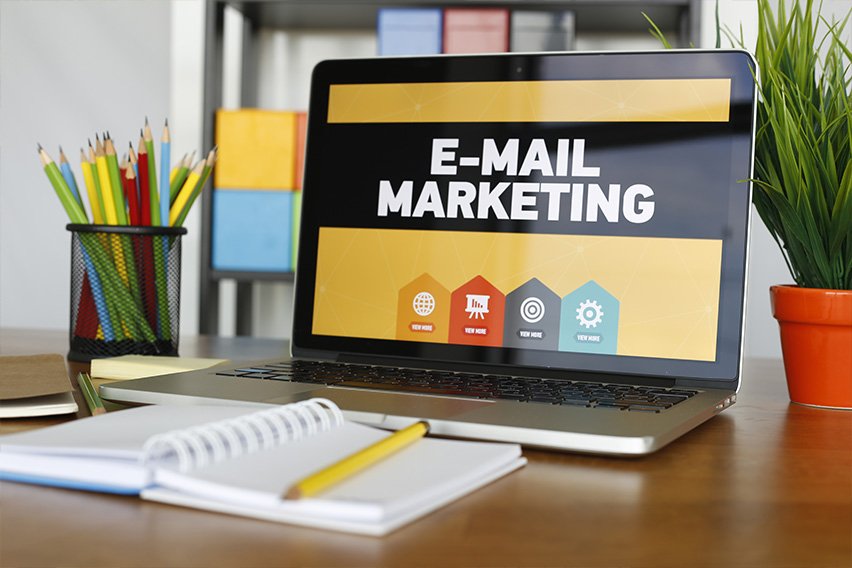 Small Business Email Marketing: Top 5 Benefits of Email Marketing
Small Business Email Marketing: Top 5 Benefits of Email Marketing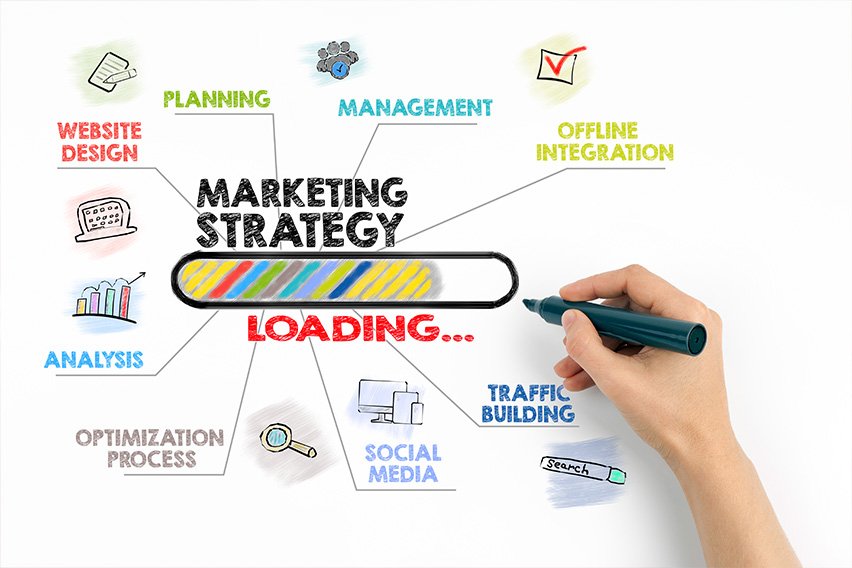 How to Advertise My Small Business: 7 Best Advertising Strategies
How to Advertise My Small Business: 7 Best Advertising Strategies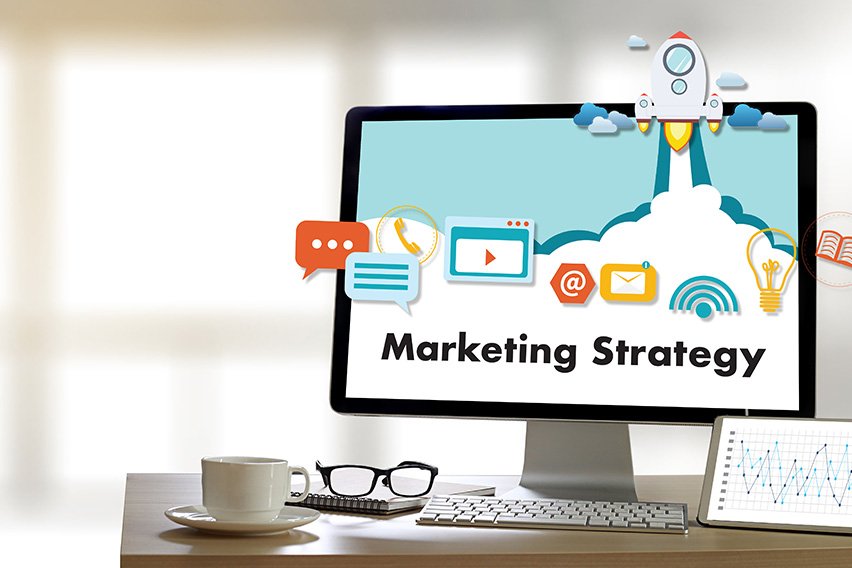 9 Small Business Marketing Strategies on a Tight Budget
9 Small Business Marketing Strategies on a Tight Budget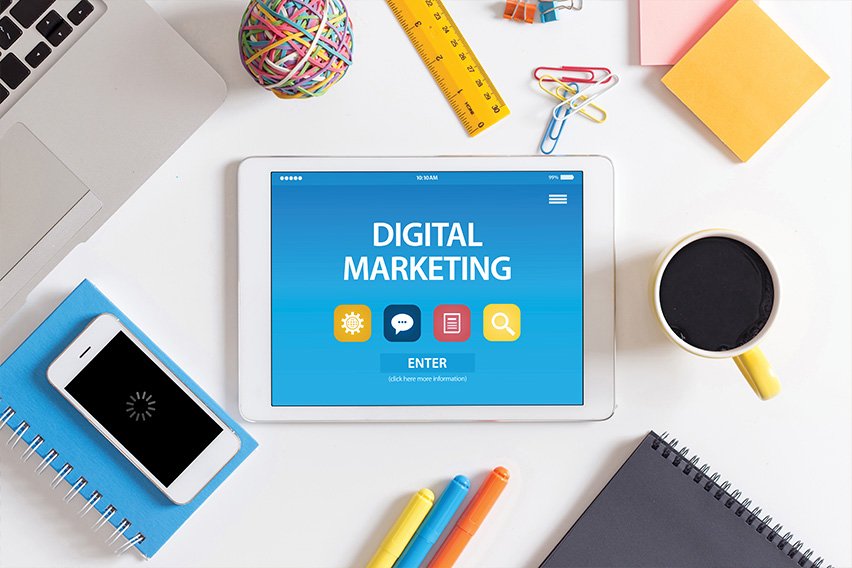 Digital Marketing for Small Businesses: the Top 5 Channels & Methods Critical for Success
Digital Marketing for Small Businesses: the Top 5 Channels & Methods Critical for Success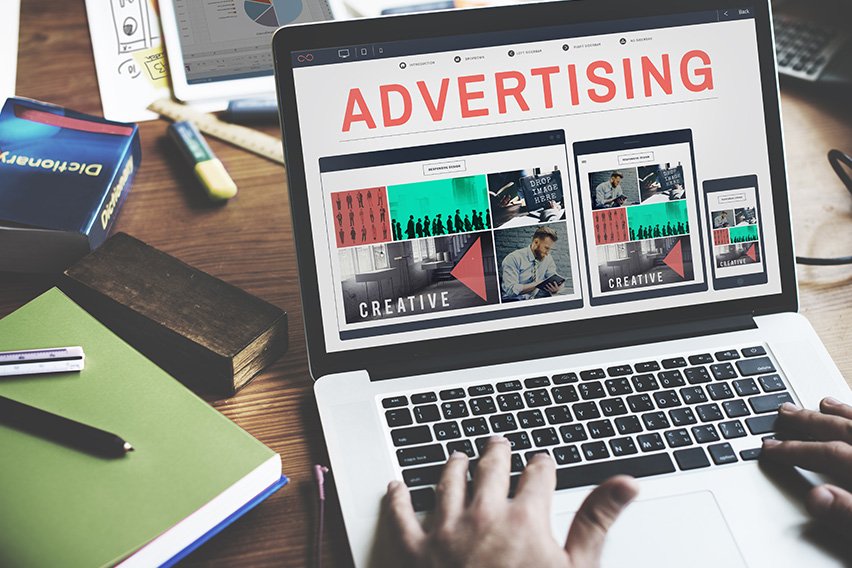 7 Types of Advertising to Promote Your Small Business Effectively
7 Types of Advertising to Promote Your Small Business Effectively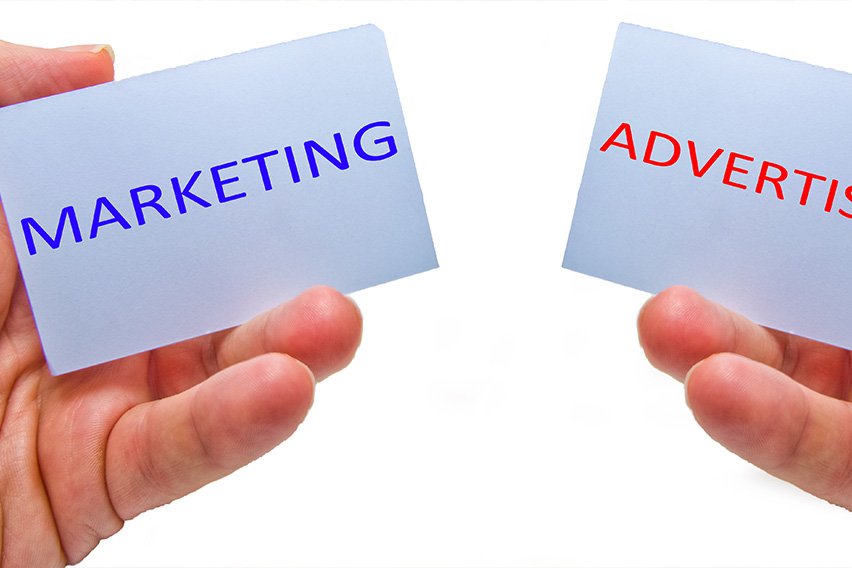 The Difference Between Marketing and Advertising: Why Your Small Business Needs Both
The Difference Between Marketing and Advertising: Why Your Small Business Needs Both